
Putting
It All
Together
How the Career Center prepares Villanovans for whatever comes next
Countless personal stories illustrate the transformative power of Villanova’s career services: The graduate Engineering student who received expert guidance in negotiating the terms of a summer internship that resulted in a full-time job offer. The Communication major who explored the film industry on a spring break immersion trip to Los Angeles, then built on connections he made there to launch his own career in film production. The College of Professional Studies student who learned how to re-tool his résumé to showcase his new qualifications. The alumna who took advantage of career coaching to help her re-enter the workplace after devoting several years to her family.
“We believe that finding meaning in your work and forging a career path is a deeply personal and highly individualized process, and we work to support Villanovans through every phase of their journey,” says Kevin Grubb, associate vice provost for Career and Professional Development, who oversees the Villanova University Career Center. “We provide services to 11,000 undergraduate and graduate students and 130,000 alumni, but work diligently to personalize each individual’s experience with our services.”
The success of the Career Center’s programs is no accident: In the course of his tenure at Villanova, Grubb has kept a keen eye trained on trends in hiring and employment, anticipating areas of growth and building a foundation that allows for flexibility and innovation. When Grubb arrived at Villanova in 2010, he was part of a team of nine. Today, 21 professional staff, supported by a fleet of part-time undergraduate and graduate student assistants, are organized in teams that specialize in career development, employer relations, professional and personal development, career management, and operations.
In addition to the teams in the Career Center proper, each of Villanova's colleges has its own curriculum or team of professionals concentrating on the specific professional development needs of the students and alumni in that program. Several of these college-specific professional development programs have garnered awards and recognition for their forward-thinking and innovative programming, and all incorporate a multi-faceted approach that is constantly evolving to reflect the latest needs in their respective industry. This collaborative structure developed organically in response to the needs of the community. “It was important to Villanova's leadership that some sort of career and professional development was connected to the education students were receiving, and not left to chance,” Grubb says.
Villanova University Provost Patrick G. Maggitti, PhD, stresses that Villanova’s assertive approach to career development stems in part from the University’s responsibility to students. “Given the rising cost of higher education, offering return on investment has never been more important,” he says. “Father Peter and I were both the first in our family to go to college, so we understand and appreciate the sacrifices our students—and often their families—make to attend Villanova. Our commitment to making sure that students have positive outcomes is connected to our Augustinian mission, but it’s also just the right thing to do.”
Opportunities and Outcomes
The impact of Villanova’s career services is far from anecdotal. Career and professional development opportunities abound for Villanova students and alumni—and it shows in data collected by the Villanova Career Center for the 2021-22 academic year.
128,000+
job openings and internships were posted on Handshake, the University’s career services platform
24,000+
Villanovans were available for networking on the Nova Network
309
employers attended on-campus and virtual events to recruit Villanovans
97.8%
of Villanova’s undergraduate Class of 2021 found successful placements after graduation in careers, continuing education and other meaningful pursuits
Something for Everyone
The Career Center is many things to many people, but one thing it is not is formulaic. “Every single person’s journey is unique and deserves to be recognized in a dignified way,” Grubb says.
There are foundational things—a résumé, interview prep, access to job postings—that all students and alumni need. But other needs are very specific: How can you apply an engineering education across multiple industries? What does it mean to network with other nurses on an oncology floor? What variables should you weigh when considering a job with a startup?
Some students have already completed internships when they begin their Villanova journey, while others are only beginning to explore their options. Some begin with one ambition, then change focus and seek support through the transition. Grubb emphasizes that there is no prescribed “first step” for people who come to the center for the first time.
Nicholas Grassi ’13 CLAS, a member program specialist at Specialty Food Association, says that the Career Center was instrumental in helping him to forge his path and continues to be a favorite resource as he progresses in his career. He says, “As a student, I utilized a variety of their resources, from career coaching and résumé building to internship listings and job postings. I attended an unforgettable bus trip to Washington, D.C., where I met with representatives from the US Government, the World Bank and more–which I am convinced led me to being accepted to a once-in-a-lifetime internship opportunity with the US Embassy in Italy.”
In recent years, Grassi has taken advantage of the center’s career coaching for experienced professionals, as well as participated in its Industry Career Circles and Nova Network November. In recognition of the support he has received, Grassi also makes sure to pay that support forward to the next generation of Villanovans by participating in programs that connect current students to alumni working in their fields of interest, as well as other alumni panels and networking opportunities.
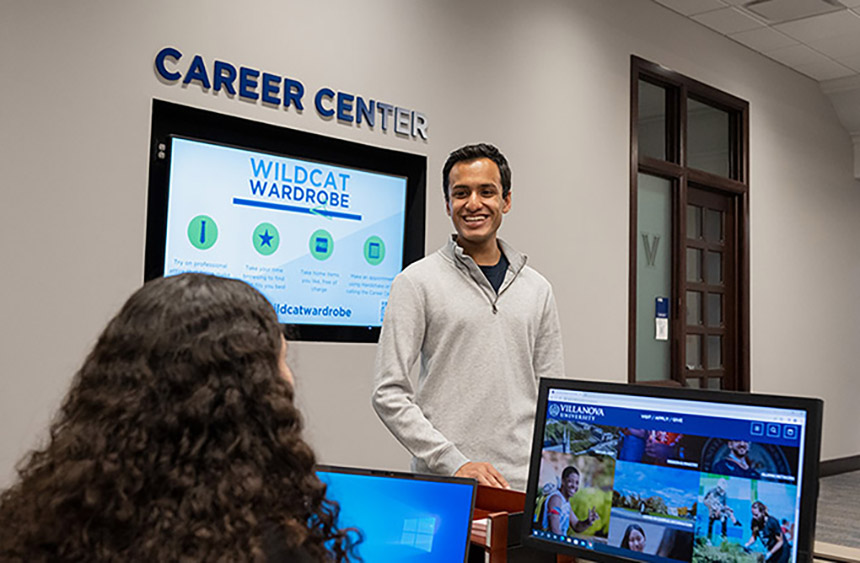
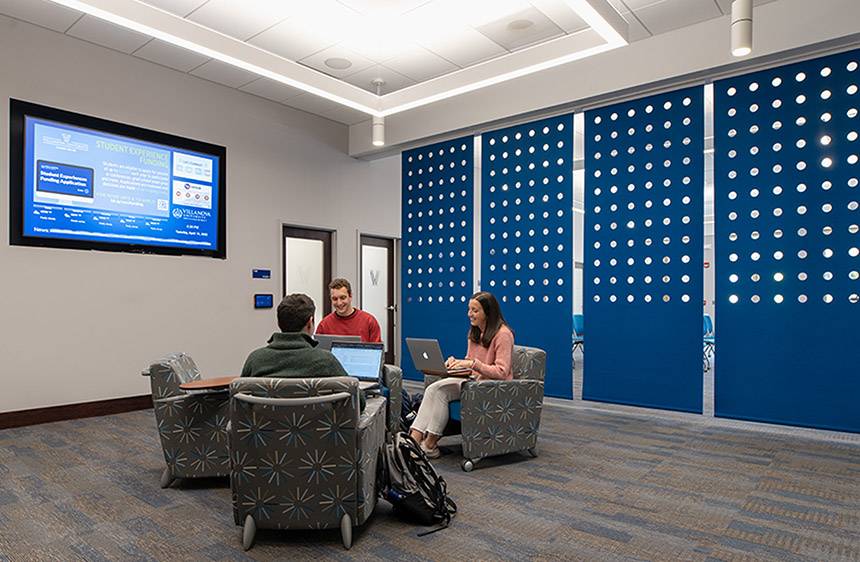
“ As a student, I utilized a variety of their resources, from career coaching and résumé building to internship listings and job postings. ”
- Nicholas Grassi ’13 CLAS
Exploring the Options
Career fairs can be a high-impact way for students to begin to engage with potential employers, practice networking, get answers to questions they have about specific companies, and receive valuable feedback. In the lead-up to a career fair, the Career Center offers résumé workshops and interviewing and networking tips so that students are ready to make a strong first impression.
For students who aren’t sure what direction they envision for their post-Villanova lives, the Career Development team is a great first contact. Career counselors guide students through a process of exploration and discernment, emphasizing that there is no “right” career journey, and linear is not always better. The team also shepherds students through the medical and law school application process and makes sure they are keyed into grad school application cycles and requirements well in advance of deadlines.
Caleb Magoola ’24 CLAS, a Computer Science major pursuing minors in Geography, History and Math, credits the Career Center with helping him to work through his options to give him a better understanding of possible job markets and how they match his skill set. He says his experiences with the Career Center have given him two important takeaways: “First, everyone has a unique journey and timeline, and I can’t compare myself and my accomplishments to others with different backgrounds and connections. Second, it’s vital to make sure that I’m doing things that are meaningful to me during my college years, rather than doing things to look qualified.”
Tailored Support
In addition to its wide variety of comprehensive career services, Villanova’s Career Center also provides tailored support that meets the unique and individual needs and circumstances of each student. The Career Development team works with student-athletes to keep career goals in focus on and off season, while navigating the demands of Wildcats’ practice and game schedules. They also have staff dedicated to supporting students with disabilities, veterans, first-generation college students, international students, students of color and students with extenuating circumstances in the successful pursuit of a rewarding career.
Students who have a defined interest in a particular industry can tap into support and expert guidance from the Industry Advising team, which Grubb describes as “a bridge between employers and our students and alumni.” Specialists in health care and STEM, financial services and consulting, engineering, and other industries keep students up-to-date on how and when employers recruit. They stay current on trends in their designated industries, gathering and disseminating information that might help give a candidate an edge.
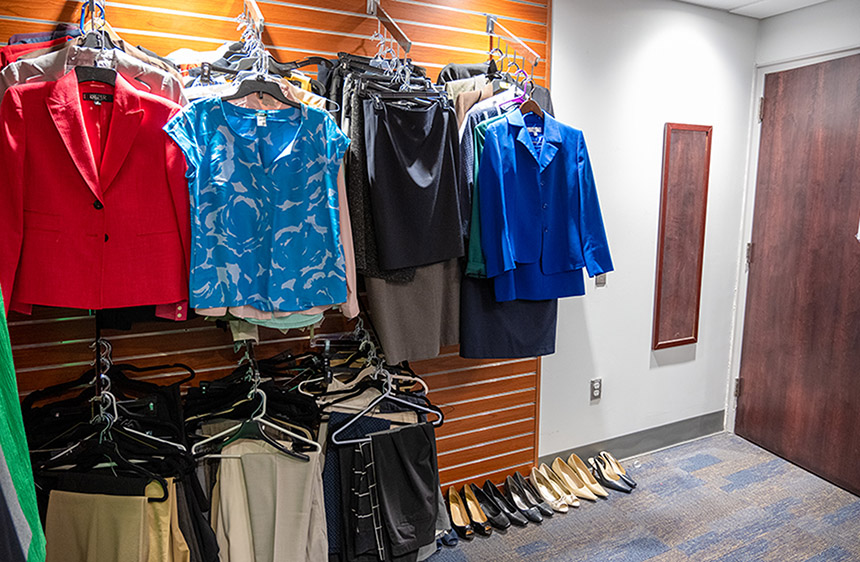
Transformative Experiences
In decades past, an internship was a nice advantage for a young job-seeker, but in the current job marketplace, practical job experience has become a must-have, whether it’s in the form of an internship, a research position or a service-learning opportunity.
Of course, the Center recognizes that many internships are unpaid or low-paying positions that are not realistic for every student’s financial situation. In those cases, the Career Center works with partners across campus to fund these essential and often transformative professional experiences. “We’re always looking for ways to augment the financial support we can offer students for internships, because we don’t ever want money to be a barrier between a student and a life-changing opportunity,” Grubb explains.
Kateryna Minkina ’23 CLAS is an international student from Ukraine pursuing a master’s degree in Political Science. She knew that her student visa might limit her internship prospects, so she sought out Career Center advice immediately upon her arrival on campus. The center’s staff helped Kateryna restructure her résumé and sift through internship listings to target organizations that best fit her interests and background.
When she was offered her “dream job” at the World Bank in Washington, D.C., she knew she couldn’t afford to accept an unpaid opportunity, so she applied for and won a grant through the Career Center. Kateryna says, “I’m grateful to the Career Center and to the donors who made this funding possible. Thanks to their support, I’ve got a chance to move to D.C. and follow my dream of working within an international organization concentrating on international development.”
A Design for Success
After more than a decade of strategic growth, employing industry-leading methodology to build an infrastructure that supports undergraduates, graduate students and 130,000 alumni, the Career Center embarked on a total makeover of its physical space to align its outward appearance with its internal capabilities.
“A major principle in our work is equitable access,” Grubb says. In designing the space, he and his team anticipated a wide variety of barriers students and alumni might face in their job search, and put resources in place to overcome those hurdles. With the support of generous donors who made the renovations possible, the Career Center completed its transformation in 2020, turning part of the first floor of Garey Hall into an airy, well-lit suite of offices, meeting spaces and interview rooms.
The new-and-improved Career Center has 11 private interview suites, each equipped with a computer with a high-resolution camera, a large screen and reliable sound quality. Students can book the rooms for in-person or virtual interviews and feel secure knowing that sound-canceling technology will keep their conversations confidential.
Just outside the interview suites is a multiuse space with flexible seating where the Career Center hosts in-person and virtual employer presentations, as well as information sessions and workshops. Tech-supported spaces have dramatically expanded the reach of the center’s events, according to Laura Walker, who serves as a reference point for much of the center’s student-facing programming. “Now, there’s no limit to who can attend a presentation, no matter where they are or when they graduated,” she says.
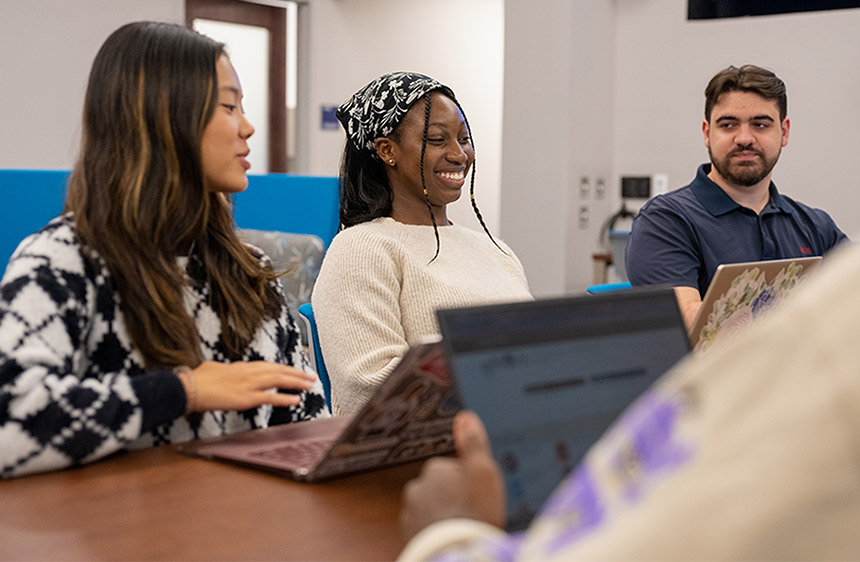
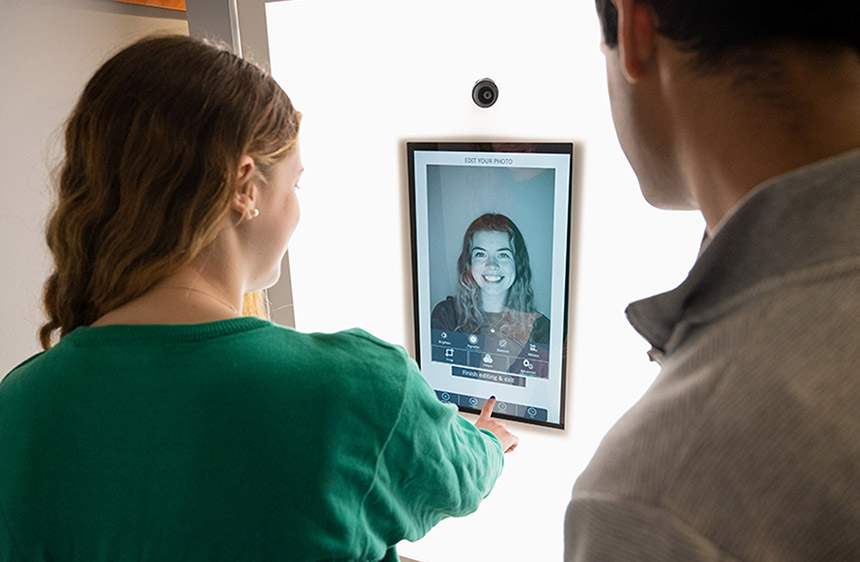
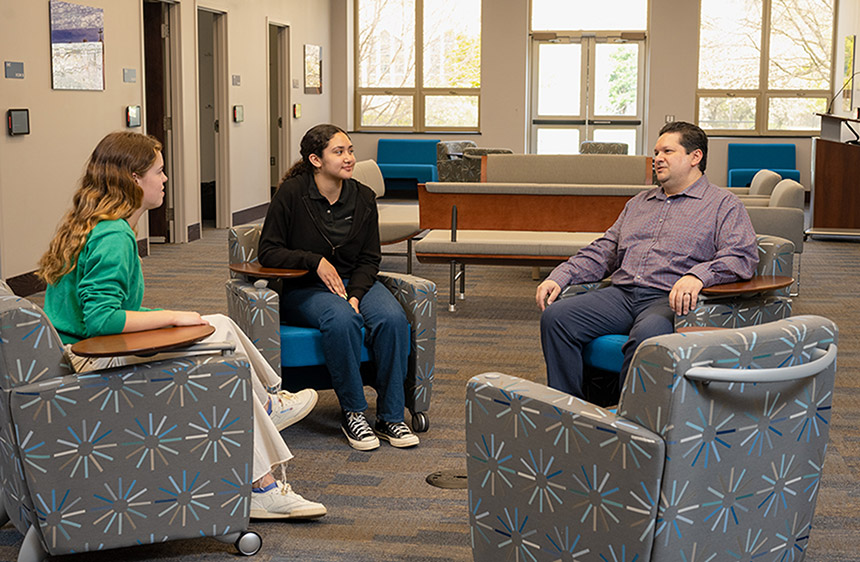
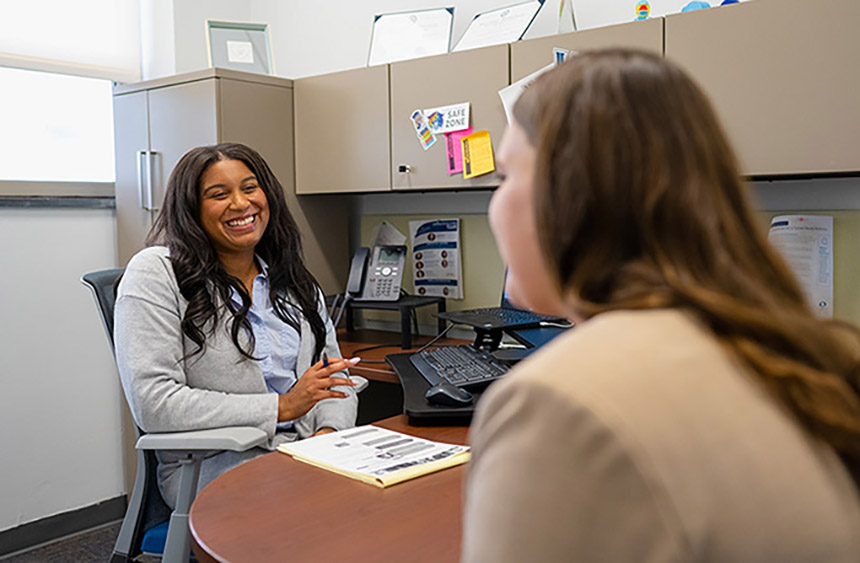
Among the center’s other exciting new offerings is a headshot booth that captures well-lit, high-res digital photos for use on networking sites. If students arrive for a photo session and they’re not quite camera-ready, Walker and her team of student workers can help: They simply refer the students to the Wildcat Wardrobe, a donation-based “boutique” where students can access professional attire and shoes at no cost.
Walker says, “It looks like a retail space, with a full-length mirror and neat racks of suits, shirts, blouses, ties, shoes—anything the students might need to get them to a point where they feel confident that they’re making a good impression.”
The new or gently used professional clothing and accessories are primarily sourced from alumni, parents, faculty and staff. The Wildcat Wardrobe team loves getting shipments or drop-offs of “new” business casual and business formal clothes, because they’ve seen students’ attitudes change completely when they know they can put their best foot forward without breaking the bank.
“Without all these building blocks you could, of course, still apply to the job—but it might be exponentially harder or more costly for you to show up in the best possible light,” Grubb says. “Providing equitable access to resources is just one of the many ways we can help ignite the change we talk about at Villanova, and help students really live their purpose.”
“ We work to support Villanovans through every phase of their journey. ”
- Kevin Grubb
COMING FULL CIRCLE
The University’s career services team prepares students to hit the ground running in whatever comes next for them—be it more schooling, service work or employment. But the support doesn’t stop there.
Working in partnership with Alumni Relations, the Career Center is in it for the long haul. The career management team provides an ever-increasing variety of support to grads throughout their decades-long career journeys—from negotiating a pay raise to making a career pivot to learning how to be an effective member of a board of trustees.
“Our work has a lot to do with return on investment,” says Sheila Doherty, director of Career Management and interim associate vice president of Alumni Relations. “When you make sacrifices to pay for an education, that education should pay you back. From graduation through retirement, alumni should always feel supported by their alma mater.”
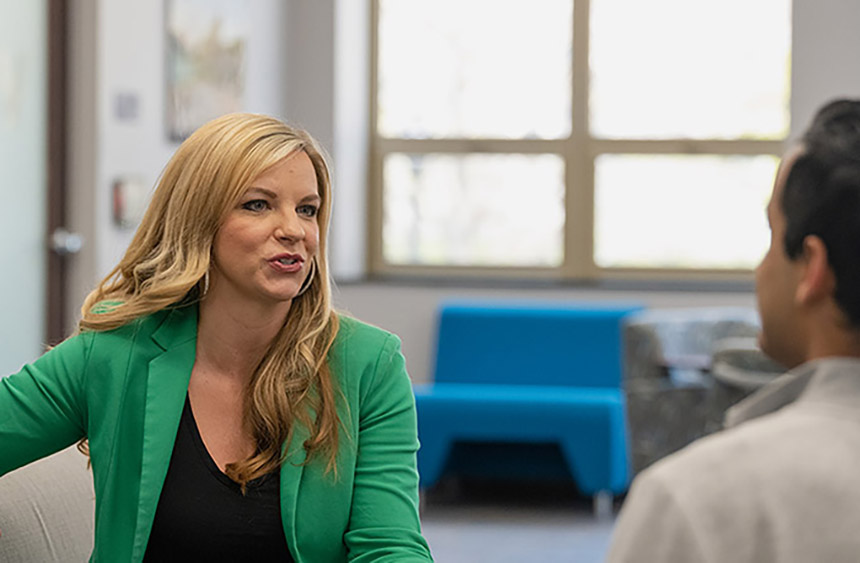
above: Villanova alumni provide guidance, opportunities and connections that help launch the next generation of Villanova change-makers into the workplace. below: From résumé tips to interview guidance or graduate school application support, the Career Center provides resources to all Villanovans as they connect their education to meaningful opportunity.
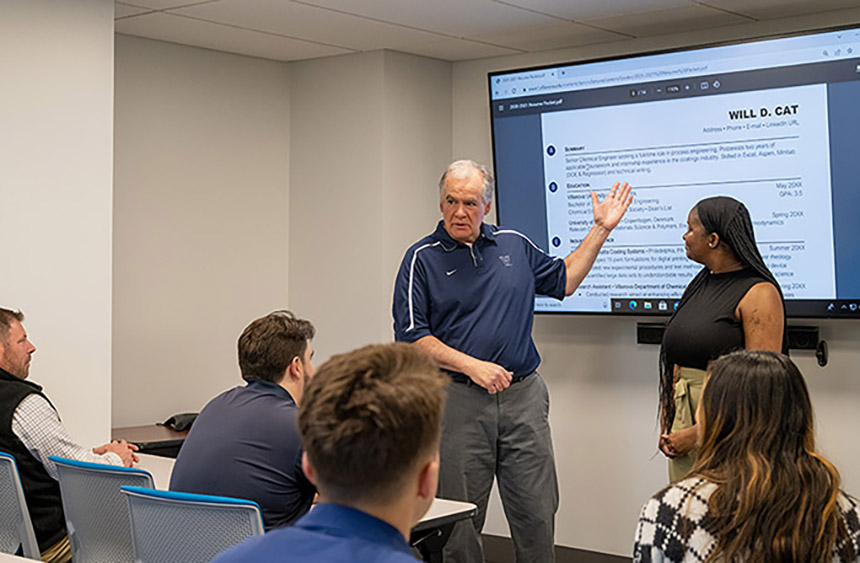
Tyler Shelton ’11 VSB first tapped into the Career Center’s alumni programming when he opted into the Career Fundamental Series for Alumni webinars. Next, he signed up for a series of individual sessions with Career Management coach Meredith Okenquist. He says, “These programs helped me as I was evaluating making a career change. The webinars were great refreshers for everything involved in the job search process. As my search progressed, meeting with Meredith was invaluable. She provided unbiased insight that helped me organize my thoughts and ultimately make a decision.”
Here are just some of the ways alumni can find support from the Career Management team:
- • Industry Career Circles let alumni deepen their knowledge of an industry while networking with other Villanovans. Interested alums apply to join a group of about 10 graduates working in a targeted industry. Each circle meets virtually on a quarterly basis to discuss trends, hear from guest speakers and share insights, with the goals of increasing members’ expertise and creating lasting professional relationships.
- • The Alumni Career Design Fellowship is a flexible, 30-day online program that inspires unfulfilled professionals through a journey of self-discovery. Villanovans work in small groups to examine and compare their competencies, interests and experiences to uncover new ways in which they might apply their skills for greater fulfillment in their work lives.
- • During Nova Network November, alumni can tap into dozens of events designed by Villanovans for Villanovans at every stage in their careers. Sessions run the gamut from résumé reviews to navigating a mid-career pivot, best practices for participation on a board of trustees, “managing up” and beyond. Recordings of past programs are housed on the Nova Network for easy access throughout the year.
- • Individual Career Counseling is available to any alum who wants an expert ear on a challenge, transition or other development in their career journey. Alumni are eligible for three complimentary sessions with a career coach, who responds to their immediate circumstances and offers guidance on a personal level.
NEXT IN FEATURES
Villanova experts weigh in on global supply chain disruptions and potential solutions